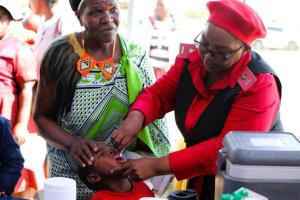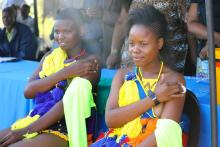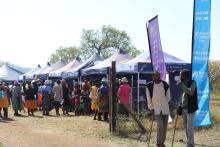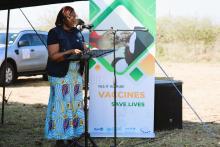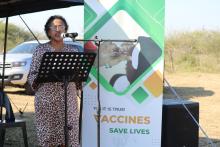Eswatini celebrates reaching over 5000 children during African Vaccination Week
Mbabane—To cultivate a healthy and productive population, the Kingdom of Eswatini successfully conducted a nationwide vaccination catch-up campaign as part of the 2025 African Vaccination Week (AVW) commemoration.
The campaign, conducted from 5-9 May 2025, reached 5,181 children with essential vaccines, a major milestone in the country’s ongoing efforts to close immunization gaps and protect against preventable diseases. Led by the Ministry of Health in collaboration with WHO, UNICEF, and other partners, the nationwide campaign expanded beyond the usual target group of children under five years to include girls aged 9–20 for the Human Papillomavirus (HPV) vaccine. This marked a groundbreaking step for Eswatini, making it the first country in the African region to vaccinate girls up to age 20 against HPV, while many others are only beginning to extend eligibility to 18. A total of 238 girls received the HPV vaccine during the 5-day campaign.
Nosimilo Dlamini, a mother of three children under five expressed her appreciation to the Ministry of Health for the outreach services.
“All my children were vaccinated at this site and all three are now up to date. I make sure that they stay protected from diseases by taking advantage of free vaccination services. As a result, they are rarely sick and do not miss school because of sickness,” she said during the launch of the AVW at Bhadlane under Lubulini Inkhundla.
The campaign offered a wide range of critical vaccines, reinforcing Eswatini’s routine immunization programme. Children received BCG for tuberculosis, bOPV and IPV for polio, DT and DTP for diphtheria, tetanus, and pertussis, HepB-Hib for Hepatitis B and Haemophilus influenzae type b, MR for measles and rubella, and PCV 1 for pneumonia. The Rotarix vaccine protected against rotavirus, a common cause of severe diarrhea, and TD boosters were given where needed. Vitamin A supplements and Albendazole were also administered to strengthen immunity and support deworming.
The success of the campaign lied on the strong community engagement, especially through traditional leaders, who proved vital in building trust and encouraging participation. Proactive outreach before the campaign using mobile platforms such as Whatsapp and community outreach helped to raise awareness and ensured smooth logistical operations. Health talks and education initiatives supported vaccine acceptance and addressed hesitancy. Further, early planning and detailed microplanning at local levels enhanced coordination and outreach.
Efforts were particularly focused on reaching zero-dose and under-immunized children in remote areas. Mobile outreach teams delivered vaccines directly to hard-to-reach communities, while health facilities offered catch-up services.
Reflecting on the campaign, Ms. Rejoice Nkambule, the Deputy Director of Health Services- Public Health said: “This campaign is more than numbers. It is about restoring trust in immunization, reaching under-served communities, and giving every child a fair shot at a healthy life.”
“Eswatini has shown strong leadership and community-driven action. Vaccination remains one of the most powerful tools we have to prevent disease, and this campaign clearly demonstrates how coordinated efforts can yield meaningful public health outcomes,” added Susan Tembo, WHO Representative to Eswatini.
Dr Tembo further pledged WHO and the entire UN’s commitment to support the government of Eswatini to identify and reach all children that have never received vaccinations (zero-dose children) so that every child benefits from the life-saving power of vaccines.
“We are working towards strengthening routine immunization, integrating services into primary health care, and roll out new vaccines to broaden disease prevention,” she said.
